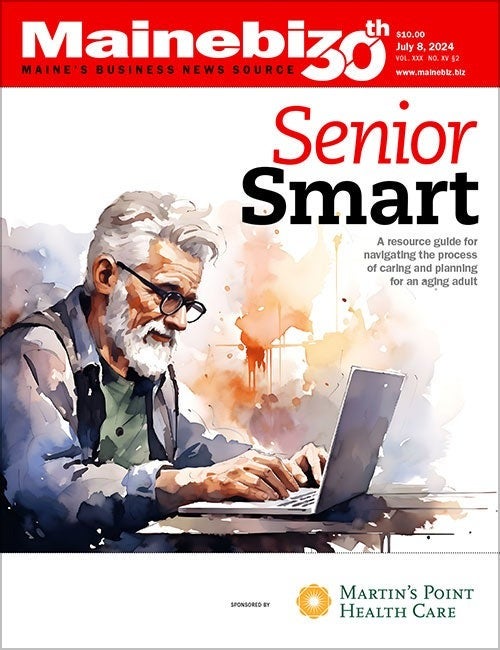Registering shock | Ensuring the integrity of Maine's elections
The Maine Heritage Policy Center recently released our study on Maine’s voter registration system (http://tinyurl.com/mhpc-study), and what we found through the course of our work was startling. After looking into the registration process, our comparison to other states and the workings of our central voter database, it became clear that the security of our ballot process hinges almost entirely on one concept: the honor system.
When a person goes into their town office to register to vote, they go through an almost comical process to prove their eligibility. If they would like to show identification, in the form of a driver’s license, they can. But if they don’t have a driver’s license, or a Social Security number, they can simply write “None” in the identification portion of the registration card. They are then able to use a piece of mail showing the registration address, like a utility bill, as verification. Thus ends the entirety of our voter eligibility check.
We were astounded there were not more checks to protect the sanctity of our votes. We found that there is no check of U.S. citizenship on our voter registration lists, and that our state government cannot tell us how many non-citizens are currently registered to vote in Maine. This is simply unacceptable.
Put plainly, Maine’s voter registration system is a mess. In three of our last 10 general elections, there were actually more registered voters than voting-age citizens in our state. Our study found that 178,000 out of a total of 972,000 registered voters in Maine are shown to have registered on January 1, 1850. We found 1,452 active registered voters shown as 211 years old, and 2,404 active registered voters with birth dates prior to 1900. And we learned that, as recently as 2007, more than 50,000 voters had more than one registration ID, opening up the chance that they could vote more than once in a single election.
No on 1
Absent proper structural components to safeguard our elections, we need to take steps to make sure non-citizens and other non-eligible voters are not registering and voting in Maine. The only way this can currently be done is to ask municipal clerks to manually check the validity of registrations. This is not the optimum way to run an election, but it is currently the only way to ensure the integrity of the process. This manual check is impossible with Election Day registration.
Proponents of Election Day registration persist in the general claim that its repeal will disenfranchise voters. This is absurd, when you consider that 93% of all U.S. voters are required to register in advance of Election Day. MHPC’s research shows that specific claims of disenfranchisement are also easily refuted by the facts.
First, the Yes on 1 campaign has claimed that some voters will be disenfranchised by the necessity of making two trips to the polls — one to register and one to vote. This is a false claim. The Maine Legislature repealed Election Day registration, but not same day registration. Voters who can only make one trip can still go to their town office, register and vote absentee on the same day.
Yes on 1 has claimed that voters who are registered but have been inadvertently purged from the voter list will be disenfranchised if they show up and find their registrations missing. This is untrue as well. Voters in this situation are allowed to cast provisional ballots, which are verified and counted after the polls are closed.
Yes on 1 has claimed that Election Day registration repeal is a plot by Republicans to suppress Democrat votes. However, in Maine’s 2010 election, Democrats and Republicans utilized Election Day registration at the same rate. This means any effort to suppress votes would affect both parties equally.
Finally, Yes on 1 has claimed that Election Day registration repeal will decrease voter turnout. There is no statistical evidence to support this. When Maine passed Election Day registration in 1972, there was no perceptible change in turnout percentages. In fact, the three lowest turnout years Maine has seen in 50 years all happened after Election Day registration was passed.
Maine’s use of Election Day registration has been convenient for many new voters, but this convenience does not outweigh the need to provide at least a modicum of structural safeguard against errors or fraud in our election system. Maine should look toward Election Day registration as a goal for the future, but not until we have an infrastructure in place that allows our state to accurately assess the validity of voter registrations.
Lance Dutson, chief executive officer of The Maine Heritage Policy Center, can be reached at lance@mainepolicy.org. Read more Public Engagement here.
No tinkering needed | Yes on Question One preserves our democratic process
BY KAITLIN LACASSE
Director of Politics & Communications, OneMaine
Question One on the November ballot asks, “Do you want to reject the section of Chapter 399 of the Public Laws of 2011 that requires new voters to register to vote at least two business days prior to an election?”
I urge you to vote Yes on Question One.
For nearly four decades, Maine has allowed Election Day registration for those citizens who are eligible to vote. This long-standing tradition has helped Maine lead the country in voter participation. In 2010, Maine ranked first in the nation for voter participation. At a time when our democracy is challenged as never before, we should be proud of this leadership, not try to eliminate the rule that makes that possible.
Election Day voter registration is not a partisan issue, but a voter rights issue. We should not be erecting unnecessary barriers to the participation in our political process.
Mainers across the political spectrum have benefited from Election Day voter registration. In 2008, 49,666 people registered to vote on Election Day. Of those, 22,210 registered as unenrolled voters (independents); 13,910 registered as Democrats, 9,561 as Republicans and 3,985 as Greens.
Of the 18,364 voters who registered on Election Day in November 2010, 7,759 registered as unenrolled voters, 4,468 registered as Democrats, 4,405 as Republicans, and 1,732 as Greens.
In these tough economic times, many Mainers are working multiple jobs and having to drive longer and longer distances for those opportunities. Folks often do not have the time to go to their town office twice -- once to register and once to vote. In the absence of a compelling reason to require two trips, why try to fix something that isn't broken?
The facts are that Election Day voter registration works well and that people who want to change the rules no coherent reason or argument to do so.
One argument presented by the "No on 1" folks is that our town clerks are overwhelmed on Election Day and therefore can’t accurately process new registrants. Yet, the very folks who bear this supposed burden actively support maintaining Election Day voter registration. The Maine Town and City Clerks Association testified against the elimination of same-day registration, and the Maine Municipal Association recently endorsed "Yes on 1."
Next, those who want you to vote no argue that voter fraud is a big problem in Maine -- or, if it isn't, well, maybe someday it could be. But what did the Secretary of State's investigation reveal? There is no evidence of any significant voter fraud. In the 38 years that Maine has allowed Election Day voter registration, there have been only two instances of prosecuted voter fraud.
More recently, the opponents of Election Day voter registration shifted to the argument of the “potential for fraud.” This was sly. Essentially, they have said, “We have no proof of an issue but there could some day, potentially, maybe, be an issue … so we should right now move to limit the single most critical opportunity to participate in our democratic process.”
By that same logic, you could ask “No on 1” advocates if they will move to take all cars off the roads and all shotguns out of homes. (Better yet, just go to the polls Nov. 8 and vote yes for voter rights.)
Maine has always had a tradition of public participation in our political process. We go to town meetings, we discuss the local, state and national issues and we make informed decisions and then cast our votes accordingly. Our neighbors and family members are on school boards, town councils, planning boards and other local committees. Our state legislators make public their home and cell phone numbers, and voters routinely show up in Augusta to express their opinions on issues. We see local and state representatives, our members of Congress and the governor at town fairs, parades, chamber meetings, farmers’ markets and just about everywhere in between. They are happy to speak with us, engage with us and help whenever possible. We have an accessible, open political process, because this is the Maine way.
The Maine way is no accident, because we Mainers want our political process to be open and accessible. There are over 20 organizations that have joined the Protect Maine Votes coalition in support of Yes on One (only two organizations have come out in opposition). Although our organizations often work on distinct and different agendas, our staff and volunteers have joined forces to do what is right for the state of Maine: help maintain the tradition of voter access and participation by continuing to allow eligible voters to register to vote on Election Day.
We hope you will join us. Vote "Yes on 1" to preserve Election Day voter registration.








Comments